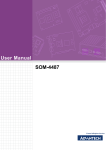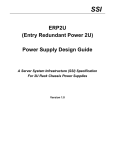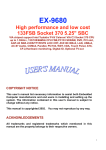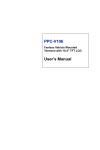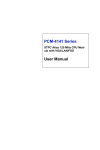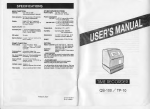Download PCM-9578 Users` Manual
Transcript
PCM-9578 Socket 370 Celeron™/Pentium® III SBC with 4 Ethernet, CFC and GPIO Users’ Manual Copyright This document is copyrighted, © 2003. All rights are reserved. The original manufacturer reserves the right to make improvements to the products described in this manual at any time without notice. No part of this manual may be reproduced, copied, translated or transmitted in any form or by any means without the prior written permission of the original manufacturer. Information provided in this manual is intended to be accurate and reliable. However, the original manufacturer assumes no responsibility for its use, nor for any infringements upon the rights of third parties that may result from such use. Acknowledgements IBM, PC/AT, PS/2 and VGA are trademarks of International Business Machines Corporation. Intel and StrongARM are trademarks of Intel Corporation. Microsoft Windows® CE.NET is a registered trademark of Microsoft Corp. All other product names or trademarks are properties of their respective owners. For more information on this and other Advantech products, please visit our websites at: http://www.advantech.com http://www.advantech.com/epc For technical support and service, please visit our support website at: http://support.advantech.com This manual is for the PCM-9578F, rev. A1. Part No. 2006957810 1st Edition: January, 2003 PCM-9578 User’s Manual ii Packing List Before you begin installing your card, please make sure that the following materials have been shipped: • 1 PCM-9578F all-in-one single board computer • 1 CD disc with utility and drivers • 1 Startup Manual • 1 mini jumper package [10 pcs] (p/n: 9689000002) • 1 EBX 7P - 4P power cable If any of these items are missing or damaged, contact your distributor or sales representative immediately. Please refer to Appendix C for the optional interface wiring kit. Additional Information and Assistance Step 1. Visit the Advantech web site at www.advantech.com/risc where you can find the latest information about the product. Step 2. Contact your distributor, sales representative, or Advantech's customer service center for technical support if you need additional assistance. Please have the following information ready before you call: • Product name and serial number • Description of your peripheral attachments • Description of your software (operating system, version, application software, etc.) • A complete description of the problem • The exact wording of any error messages iii PCM-9578 User’s Manual iv Contents Chapter 1 General Information ........................................2 1.1 1.2 1.3 1.4 Introduction ....................................................................... 2 Features ............................................................................. 3 Specifications .................................................................... 3 Dimensions and Board Layout.......................................... 5 Figure 1.1:PCM-9578 dimensions.................................. 5 Chapter 2 Installation ........................................................8 2.1 Jumpers.............................................................................. 8 2.2 Connectors......................................................................... 9 2.3 Locating Jumpers ............................................................ 10 2.4 Locating Connectors ....................................................... 11 Table 2.1:Jumpers........................................................... 8 Table 2.2:Connectors on the PCM-9578 ........................ 9 Figure 2.1:Locating Jumpers ........................................ 10 Figure 2.2:Locating Connectors (component side)....... 11 Figure 2.3:Locating Connectors (solder side)............... 12 2.5 2.6 Setting Jumpers ............................................................... 13 CPU installation and upgrading ...................................... 14 2.6.1 2.6.2 2.7 Installing DRAM (SODIMMs) ....................................... 15 2.7.1 2.7.2 2.8 Connecting the hard drive............................................. 16 Floppy drive connector (CN14, optional) ....................... 17 2.9.1 2.10 2.11 2.12 Introduction................................................................... 15 Installing SODIMMs .................................................... 16 IDE Hard Drive Connector (CN8) .................................. 16 2.8.1 2.9 Installing a CPU in the ZIF socket................................ 14 CMOS clear (J4) ........................................................... 15 Table 2.3:CMOS clear (J4)........................................... 15 Connecting the floppy drive ......................................... 17 Parallel port connector (CN9) ......................................... 17 Keyboard and PS/2 mouse connector (CN11) ................ 18 Power & HDD indicator LED connector (CN4)............. 18 2.12.1 Reset switch .................................................................. 18 2.13 Power connectors (CN1, CN10, CN25, CN29) .............. 18 2.13.1 Main power connector, +5 V, +12 V (CN29)............... 18 2.13.2 Fan power connector (CN1, CN10, CN25, CN7)......... 18 2.14 ATX power control connector (CN22, CN23)................ 19 2.14.1 ATX feature conn (CN23) & power button (CN22)..... 19 Figure 2.4:Wiring for ATX power switch function...... 19 2.15 2.16 COM-port connector (CN13, CN16) .............................. 20 VGA interface connections (CN18)................................ 20 v 2.17 Ethernet configuration..................................................... 20 2.17.1 100Base-T connector (CN1, CN4, CN5)...................... 20 2.17.2 Network boot ................................................................ 20 2.18 2.19 2.20 Chapter Ethernet 3, Ethernet 4 bypass function............................ 21 USB connectors (CN12).................................................. 21 Digital I/O (CN5) ............................................................ 21 3 Award BIOS Setup.........................................24 3.1 System test and initialization........................................... 24 3.1.1 3.2 System configuration verification................................. 24 Award BIOS setup .......................................................... 24 3.2.1 Entering setup ............................................................... 25 Figure 3.1:Setup program initial screen........................ 25 3.2.2 Standard CMOS setup .................................................. 26 Figure 3.2:CMOS setup screen..................................... 26 3.2.3 BIOS features setup ...................................................... 27 Figure 3.3:BIOS features setup..................................... 27 3.2.4 Chipset features setup ................................................... 28 Figure 3.4:Chipset features setup.................................. 28 3.2.5 Power management setup ............................................. 29 Figure 3.5:Power management setup............................ 29 3.2.6 PnP/PCI configuration .................................................. 30 Figure 3.6: PnP/PCI configuration................................ 30 3.2.7 Integrated peripherals ................................................... 31 Figure 3.7:Integrated peripherals.................................. 31 3.2.8 Load BIOS defaults ...................................................... 32 Figure 3.8:Load BIOS defaults..................................... 32 3.2.9 Change password .......................................................... 33 3.2.10 Auto detect hard disk .................................................... 34 Figure 3.9:IDE HDD auto detection screen.................. 34 3.2.11 Save & exit setup .......................................................... 34 3.2.12 Exit without saving ....................................................... 34 Chapter 4 AGP SVGA Setup ..........................................36 4.1 Introduction ..................................................................... 36 4.1.1 4.1.2 4.1.3 4.2 4.3 4.4 4.5 Chipset .......................................................................... 36 Display types................................................................. 36 Dual/simultaneous display............................................ 36 Figure 4.1:Selecting display settings ............................ 37 Installation of SVGA driver ............................................ 37 Installation for Windows 98 and 2000 ............................ 38 Installation for Windows NT........................................... 43 Further information ......................................................... 47 PCM-9578 User’s Manual vi Chapter 5 PCI Bus Ethernet Interface...........................50 5.1 5.2 Introduction ..................................................................... 50 Installation of Ethernet driver ......................................... 50 5.2.1 5.3 5.4 5.5 Installation for MS-DOS and Windows 3.1.................. 50 Installation for Windows 95/98/2000.............................. 51 Installation for Windows NT........................................... 53 Further information ......................................................... 55 Appendix A Pin Assignments .............................................58 A.1 A.2 A.3 A.4 A.5 A.6 A.8 A.9 A.10 A.11 A.12 A.13 A.14 A.15 A.16 Ethernet 10/100Base-T (CN26, CN24, CN20, CN17)... 58 ATX Power Feature Connector (CN23) ..................... 58 Keyboard and PS/2 Mouse Connector (CN11) ............... 59 Main Power Connector (CN29) ...................................... 60 Floppy Disk Drive Connector (CN14) ............................ 61 IDE Hard Drive Connector (CN8) ................................. 62 CRT Display Connector (CN18)..................................... 64 Power & HDD LED Connector(CN4) ............................ 64 USB Connector (CN12) .................................................. 65 Serial Port 1 connector DB-9 (CN13) ............................. 66 Serial Port 2 connector (CN16)....................................... 66 CompactFlash™ Card Connector (CN30) .................... 67 CPU fan power connector (CN10, CN1) ........................ 68 System fan power connector (CN25) .............................. 68 Fan failure LED (CN7) ................................................... 68 Appendix B System Assignments .......................................70 B.1 B.2 B.3 B.4 System I/O Ports.............................................................. 70 1st MB memory map....................................................... 71 DMA channel assignments.............................................. 71 Interrupt assignments ...................................................... 72 Appendix C Optional Extras ..............................................74 C.1 PCM-10586-5E cable kit for PCM-9578 ........................ 74 Appendix D Mechanical Drawings.....................................76 D.1 D.2 Component Side .............................................................. 76 Solder Side ...................................................................... 77 vii PCM-9578 User’s Manual viii CHAPTER 1 General Information This chapter gives background information on the PCM-9578. Sections include: • Introduction • Features • Specifications • Board layout and dimensions Chapter 1 General Information 1.1 Introduction The PCM-9578F is an all-in-one Celeron™Pentium® III level single board computer (SBC) with quadruple Ethernet interfaces, 2 COM, 8 GPIO and one PCI expansion slot. The PCM-9578F supports Pentium III (Tualatin) processors up to 1.26 GHz. It has an optional LAN3/LAN4 bypass function. This compact unit is only 203 x 146 mm (8" x 5.75"). It offers all the functions of a single board industrial computer, but still fits in the space of a 5.25" CD ROM drive, and 1 U chassis for the networking appliance market. On-board features include two serial ports, one multi-mode parallel (ECP/EPP/SPP) port, two USB (Universal Serial Bus) ports, one CompactFlash socket for CFC, and a keyboard/PS/2 mouse interface. The built-in high-speed PCI IDE controller supports PIO, UDMA/33 and bus master modes. Up to two IDE devices can be connected, including large hard disks, CD-ROM drives and tape backup drives. The PCM-9578F features power management to minimize power consumption. It complies with the “Green Function” standard and supports doze, standby and suspend modes. In addition, the boardís watchdog timer can automatically reset the system or generate an interrupt in case the system stops due to a program bug or EMI. The PCM-9578F has been certified as complying with FCC Class A and CE Marking Class A. Quad Ethernet for Communication Appliances The PCM-9578 supports 4 Ethernet interfaces designed for the Communication Market. It can be used for firewall and VPN applications. A PCI slot is available so the customer can add a fifth ethernet or use a VPN & security PCI card. PCM-9578 User’s Manual 2 1.2 Features • Supports Pentium® III(Tualatin) /Celeron™ processors up to 1.26GHz • Supplies scalable ethernet, 3 or 4 10/100 Mbps ports • Optional LAN3–LAN4 bypass function • Supports redirection function to control console via serial port • PCI slot for hardware expansion • 8 general purpose input/outputs (GPIO) 1.3 Specifications Standard SBC functions • CPU: Socket 370 supports FC-PGA & FC-PGA2 type Intel Pentium III/Celeron with 512K (Tualatin) processor up to 1.26GHz • Note: Does not support PPGA type Pentium III/Celeron • BIOS: Award 256 KB Flash memory • System memory: One SODIMM socket accepts 64 MB up to 512 MB SDRAM • 2nd cache memory: 128KB/256KB/512KB on the processor • System Chipset: Intel 815E chipset, 82815 GMCH and 82801BA ICH2 • Enhanced IDE interface: One channels supports up to two EIDE devices. BIOS auto-detect, PIO Mode 3 or Mode 4, UDMA 33 mode. • FDD interface: Supports up to two FDDs (optional) • Serial ports: Two serial RS-232 ports • Parallel port: One parallel port, supports SPP/EPP/ECP mode • Keyboard/mouse connector: Supports standard PC/PS/2 keyboard and a PS/2 mouse • Power management: Supports power saving modes including Normal/Standby/Suspend modes. APM 1.2 compliant • Watchdog timer: 62 level timer intervals 3 Chapter 1 • USB: Two universal serial bus ports, USB 1.1 compliant • GPIO: 8 General Purpose programable I/Os Solid State Disk • Supports one 50-pin socket for CFC type I/II VGA/LCD Interface • Chipset: Intel 82815 GMCH • Frame buffer: Supports 8/16/32 MB frame buffer with system memory • Interface: direct AGP interface • Display modes: • CRT Modes: 1600 x 1200 @8bpp (75Hz), • 1280 x 1024@24bpp (85Hz), • 1024 x 768 @24bpp (85Hz) Ethernet interface • Chipset:Intel 82562 +82559ER x 3 (optional 3 x 82559 or 3 x RTL 8139C+) • Ethernet interface: IEEE 802.3u 10/100BASE-T Fast Ethernet compatible • I/O address switchless setting Mechanical and Environmental • Dimensions (L x W): 203 X 146mm (8" x 5.75") • Power supply voltage: +5 V, ± 5% • Power requirements: • max 10A @ +5V • typical 5.6A @ +5V, (with 256 MB DRAM, Intel PIII 1.26GHz CPU) • Operating temperature: 0 ~ 60×C • Operating Humidity: 0% ~ 90% Relative Humidity, noncondensing PCM-9578 User’s Manual 4 (32 ~ 140×F) 1.4 Dimensions and Board Layout Figure 1.1: PCM-9578 dimensions 5 Chapter 1 PCM-9578 User’s Manual 6 CHAPTER 2 Installation This chapter tells how to set up the PCM-9578F hardware, including instructions on setting jumpers and connecting peripherals, switches and indicators. Be sure to read all the safety precautions before you begin the installation procedure. Chapter 2 Installation 2.1 Jumpers The PCM-9578F has a number of jumpers that allow you to configure your system to suit your application. The table below lists the function of each of the board’s jumpers: Table 2.1: Jumpers Jumper Function J1 PCI VIO select J2 LAN3, LAN4 bypass function select (optional) J3 LAN3, LAN4 bypass function select (optional) J4 CMOS clear jumper J5 Firmware Hub Lock read/write enable PCM-9578 User’s Manual 8 2.2 Connectors On-board connectors link the PCM-9578F to external devices such as hard disk drives, a keyboard, or floppy drives. The table below lists the function of each of the board’s connectors:. Table 2.2: Connectors on the PCM-9578 Label Function CN1 System fan1 CN4 Power & HDD LED connector CN5 Digital I/O CN6 Reset button connector CN7 Fan fail LED CN8 IDE1 CN9 Printer port CN10 System fan1 CN11 Keyboard and PS2 mouse CN12 USB CN13 Serial port 1 CN14 FDD (Optional) CN15 LAN4 LED CN16 Serial port2 CN17 LAN4 RJ45 CN18 VGA CN19 LAN3 LED CN20 LAN3 RJ45 CN21 LAN2 LED CN22 ATX power on/off button CN23 ATX power suspend 5V & PS_ON signal CN24 LAN2 RJ45 CN25 CPU fan CN26 LAN1 RJ45 CN27 LAN1 LED CN29 EBX power 9 Chapter 2 2.3 Locating Jumpers Figure 2.1: Locating Jumpers PCM-9578 User’s Manual 10 2.4 Locating Connectors Figure 2.2: Locating Connectors (component side) 11 Chapter 2 Figure 2.3: Locating Connectors (solder side) PCM-9578 User’s Manual 12 2.5 Setting Jumpers You may configure your card to match the needs of your application by setting jumpers. A jumper is a metal bridge used to close an electric circuit. It consists of two metal pins and a small metal clip (often protected by a plastic cover) that slides over the pins to connect them. To “close” a jumper, you connect the pins with the clip. To “open” a jumper, you remove the clip. Sometimes a jumper will have three pins, labeled 1, 2 and 3. In this case you would connect either pins 1 and 2, or 2 and 3. open closed closed 2-3 The jumper settings are schematically depicted in this manual as follows:. open closed closed 2-3 A pair of needle-nose pliers may be helpful when working with jumpers. If you have any doubts about the best hardware configuration for your application, contact your local distributor or sales representative before you make any changes. Generally, you simply need a standard cable to make most connections. 13 Chapter 2 2.6 CPU installation and upgrading You can upgrade to a higher power Pentium processor at any time. Simply remove the old CPU, install the new one, and set the jumpers for the new CPU type and speed. Warning! Always disconnect the power cord from your chassis when you are working on it. Do not make connections while the power is on as sensitive electronic components can be damaged by the sudden rush of power. Only experienced electronics personnel should open the PC chassis Caution! Always ground yourself to remove any static charge before touching the PC board. Modern electronic devices are very sensitive to static electric charges. Use a grounding wrist strap at all times. Place all electronic components on a static-dissipative surface or in a static-shielded bag when they are not in the chassis. 2.6.1 Installing a CPU in the ZIF socket The PCM-9578F provides a Zero Insertion Force (ZIF) socket for easy CPU installation. 1. Make sure the ZIF socket lever is in the upright position. To raise the lever, pull it out to the side a little and raise it as far as it will go. 2. Place the CPU in the empty socket. Follow the instructions that came with the CPU. If you have no instructions, do the following: Carefully align the CPU so it is parallel to the socket and the notch on the corner of the CPU corresponds with the notch on the inside of the socket. Gently slide the CPU in. It should insert easily. If it doesn’t, pull the lever up a little more. 3. Press the lever down. The plate will slide forward. You will feel some resistance as the pressure starts to secure the CPU in the socket. This is normal and will not damage the CPU. PCM-9578 User’s Manual 14 When the CPU is installed, the lever should snap into place at the side of the socket. Note: To remove a CPU, pull the lever out to the side a little and raise it 2.6.2 CMOS clear (J4) Warning! To avoid damaging the computer, always turn off the power supply before setting “Clear CMOS.” Set the jumper back to “3V Battery On” before turning on the power supply. The procedure for clearing CMOS is: 1. Turn off the system. 2. Short pin 2 and pin 3. 3. Return jumper to pins 1 and 2. 4. Turn on the system. The BIOS is now reset to its default setting Table 2.3: CMOS clear (J4) *3.0 V battery on Clear CMOS * default setting 2.7 Installing DRAM (SODIMMs) 2.7.1 Introduction You can install anywhere from 16 MB to 512 MB of on-board DRAM memory using 16, 32, 64 or 128, 256 MB 144-pin SODIMMs (Small Outline Dual In-Line Memory Modules). 15 Chapter 2 2.7.2 Installing SODIMMs Note: The modules can only fit into a socket one way, and their gold pins must point down into the SODIMM socket. The procedure for installing SODIMMs appears below. Please follow these steps carefully. 1. Ensure that all power supplies to the system are switched Off. 2. Install the SODIMM card. Install the SODIMM so that its gold pins point down into the SODIMM socket. 3. Slip the SODIMM into the socket at a 45 degree angle and carefully fit the bottom of the card against the connectors. 4. Gently push the SODIMM into a perpendicular position until the clips on the ends of the SODIMM sockets snap into place. 5. Check to ensure that the SODIMM is correctly seated and all connector contacts touch. The SODIMM should not move around in its socket. To remove the memory module, just push both handles outward, and the module will be ejected from the socket. 2.8 IDE Hard Drive Connector (CN8) You can attach one or two Enhanced Integrated Device Electronics hard disk drives to the PCM-9578’s internal controller. The PCM-9578’s IDE controller uses a PCI local-bus interface. This advanced IDE controller supports faster data transfer, PIO mode 3, mode 4. 2.8.1 Connecting the hard drive Connecting drives is done in a daisy-chain fashion and requires one of two cables (not included in this packing), depending on the drive size. 1.8" and 2.5" drives need a 1 x 44-pin to 2 x 44-pin flat-cable connector. 3.5" drives use a 1 x 44-pin to 2 x 40-pin connector. Wire number 1 on the cable is red or blue, and the other wires are gray. 1. Connect one end of the cable to CN8. Make sure that the red (or blue) wire corresponds to pin 1 on the connector, which is labeled on the board (on the right side). 2. Plug the other end of the cable to the Enhanced IDE hard drive, with pin 1 on the cable corresponding to pin 1 on the hard drive. (See your hard drive’s documentation for the location of the connector.) PCM-9578 User’s Manual 16 Connect a second drive as described above. Unlike floppy drives, IDE hard drives can connect to either end of the cable. If you install two drives, you will need to set one as the master and one as the slave by using jumpers on the drives. If you install just one drive, set it as the master. 2.9 Floppy drive connector (CN14, optional) You can attach up to two floppy drives to the PCM-9578F’s on-board controller. You can use 3.5” (720 KB, 1.44 MB, and 2.88 MB) drives. A 26-pin daisy-chain drive connector cable is required for a dual-drive system. On one end of the cable is a 34-pin flat-cable connector. On the other end are two sets of floppy disk drive connectors. Each set consists of a 34-pin flat-cable connector (usually used for 3.5” drives). 2.9.1 Connecting the floppy drive 1. Plug the 26-pin flat-cable connector into CN14. Make sure that the red wire corresponds to pin one on the connector. 2. Attach the appropriate connector on the other end of the cable to the floppy drive(s). You can use only one connector in the set. The set on the end (after the twist in the cable) connects to the A: drive. The set in the middle connects to the B: drive. If you need to make your own cable, you can find the pin assignments for the board’s connector in Appendix A. 2.10 Parallel port connector (CN9) Normally, the parallel port is used to connect the card to a printer. The PCM-9578F includes a multi-mode (ECP/EPP/SPP) parallel port, accessed through CN9, a 26-pin flat-cable connector. You will need an adapter cable if you use a traditional DB-25 connector. The adapter cable has a 26-pin connector on one end and a DB-25 connector on the other. The parallel port is designated as LPT1 and can be disabled or changed to LPT2 or LPT3 in the system BIOS setup. The parallel port interrupt channel is designated to be IRQ7. You can select ECP/EPP DMA channel via BIOS setup. 17 Chapter 2 2.11 Keyboard and PS/2 mouse connector (CN11) The PCM-9578F board provides a keyboard connector that supports both a keyboard and a PS/2 style mouse. In most cases, especially in embedded applications, a keyboard is not used. The standard PC/AT BIOS will report an error or fail during power-on self-test (POST) after a reset if the keyboard is not present. The PCM-9578F’s BIOS standard setup menu allows you to select “All, But Keyboard” under the “Halt On” selection. This allows no-keyboard operation in embedded system applications without the system halting under POST (power-on-self-test). 2.12 Power & HDD indicator LED connector (CN4) Next, you may want to install external switches to monitor and control the PCM-9578F. These features are optional - install them only if you need them. The front panel connector (CN4) is an 4-pin wafer box header, and provides connections for a hard disk access indicator, power on indicator, and an input switch for resetting the card. 2.12.1 Reset switch If you install a reset switch, it should be an open single pole switch. Momentarily pressing the switch will activate a reset. The switch should be rated for 10 mA, 5 V. If you need to make your own cable, you can find the pin assignments for the board’s connector in Appendix C. 2.13 Power connectors (CN1, CN10, CN25, CN29) 2.13.1 Main power connector, +5 V, +12 V (CN29) Supplies main power to the PCM-9578F (+5 V) and devices that require +12 V. 2.13.2 Fan power supply connector (CN1, CN10, CN25, CN7) The PCM-9578F provides two system FAN connectors (CN1, CN10) for system intergrator options, and one CPU fan connector (CN25) to connecting an optional CPU cooling fan. The PCM-9578 also provides a CPU fan (CN25) failure LED connector (CN7) that helps users manage the system. PCM-9578 User’s Manual 18 2.14 ATX power control connector (CN22, CN23) 2.14.1 ATX feature connector (CN23) and power button (CN22) The PCM-9578F can support an advanced power button if an ATX power supply is used. To enable the power button: 1. Take the specially designed ATX-to-PS/2 power cable PCM-9578F optional item, P/N 1703070101. 2. Connect the 3-pin plug of the cable to CN23 (ATX feature connector). Connect the power on/off button to CN22. (A momentary type of button should be used.) Important Be sure that the ATX power supply can take at least a 10 mA load on the 5 V standby lead (5 VSB). If not, you may have difficulty powering on your system. Figure 2.4: Wiring for ATX power switch function 19 Chapter 2 2.15 COM-port connector (CN13, CN16) The PCM-9578F provides two RS-232 serial ports in one COM port connector. The COM port connector consists of a DB-9 connector on board and a 10-pin, dual-in-line male header, and provides connections for serial devices (a mouse, etc.) or a communication network. You can find the pin assignments for the COM port connector in Appendix A. 2.16 VGA interface connections (CN18) The PCM-9578F’s PCI SVGA interface can drive conventional CRT displays. The board has one DB-9 connector to support standard CRT VGA monitors. Pin assignments for CRT display connector CN18 are detailed in Appendix A. 2.17 Ethernet configuration The PCM-9578F is equipped with a high performance 32-bit PCI-bus Ethernet interface which is fully compliant with IEEE 802.3U 10/ 100Mbps CSMA/CD standards. It is supported by all major network operating systems. 2.17.1 100Base-T connector (CN26, CN24, CN20, CN17) The PCM-9578F provides 3 ethernet interfaces. They are CN26 (1st LAN), CN24 (2nd LAN), CN20 (3rd LAN), and CN17 (4th LAN). When users use only three ethernet interfaces, they must use the 1st three LAN interfaces (CN26, CN24, CN20). 2.17.2 Optional Network boot (for Used RTL8139 or Intel 82559 Ethernet chip) The Network Boot feature can be utilized by incorporating the Boot ROM image files for the appropriate network operating system. The Boot ROM BIOS files are on the included utility disk. PCM-9578 User’s Manual 20 2.18 Ethernet 3, Ethernet 4 bypass function The PCM-9578F provides an optional LAN3, LAN4 bypass function. The bypass function can be controlled by power on/off or by GPIO with a jumper setting as detailed below. Table 2.4: J2, J3 LAN 3, LAN 4 bypass function control PINS auto-detect* by GPIO always enable J2 1-2 closed closed open J2 2-3 † NA NA open J3 1-2 closed NA open J3 2-3 NA closed open J2 1-2 closed closed open *default setting † note: The auto detect function can also be set by closing J2 2-3, in which case J3 can be either open or closed. 2.19 USB connectors (CN12) The PCM-9578F board provides two USB (Universal Serial Bus) interfaces which gives complete plug and play, hot attach/detach for up to 127 external devices. The USB interfaces comply with USB specification rev. 1.1 and are fuse protected. The USB interfaces are accessed through a 5 x 2 -pin flat-cable connectors, CN12. You will need an adapter cable if you use a standard USB connector. The adapter cable has a 5 x 2 -pin connector on one end and an USB connector on the other. The USB interfaces can be disabled in the system BIOS setup. 2.20 Digital I/O (CN5) The PCM-9578F supports general purpose out through CN5. The 8 digital outputs can be programmed to control input/output devices. 21 Chapter 2 PCM-9578 User’s Manual 22 CHAPTER 3 Award BIOS Setup This chapter describes how to set BIOS configuration data. Chapter 3 Award BIOS Setup 3.1 System test and initialization These routines test and initialize board hardware. If the routines encounter an error during the tests, you will either hear a few short beeps or see an error message on the screen. There are two kinds of errors: fatal and non-fatal. The system can usually continue the boot up sequence with non-fatal errors. Non-fatal error messages usually appear on the screen along with the following instructions: press <F1> to RESUME Write down the message and press the F1 key to continue the bootup sequence. 3.1.1 System configuration verification These routines check the current system configuration against the values stored in the board's CMOS memory. If they don't match, the program outputs an error message. You will then need to run the BIOS setup program to set the configuration information in memory. There are three situations in which you will need to change the CMOS settings: 1. You are starting your system for the first time 2. You have changed the hardware attached to your system 3. The CMOS memory has lost power and the configuration information has been erased. The PCM-9578's CMOS memory has an integral lithium battery backup. The battery backup should last ten years in normal service, but when it finally runs down, you will need to replace the complete unit. 3.2 Award BIOS setup Award's BIOS ROM has a built-in Setup program that allows users to modify the basic system configuration. This type of information is stored in battery-backed CMOS RAM so that it retains the Setup information when the power is turned off. PCM-9578 User’s Manual 24 3.2.1 Entering setup Power on the computer and press <Del> immediately. This will allow you to enter Setup. Figure 3.1: Setup program initial screen 25 Chapter 3 3.2.2 Standard CMOS setup When you choose the Standard CMOS Setup option from the Initial Setup Screen menu, the screen shown below is displayed. This standard Setup Menu allows users to configure system components such as date, time, hard disk drive, floppy drive and display. Once a field is highlighted, on-line help information is displayed in the left bottom of the Menu screen. Figure 3.2: CMOS setup screen PCM-9578 User’s Manual 26 3.2.3 BIOS features setup By choosing the BIOS FEATURES Setup option from the Initial Setup Screen menu, the screen below is displayed. This sample screen contains the manufacturer's default values for the PCM-9578. Figure 3.3: BIOS features setup 27 Chapter 3 3.2.4 Chipset features setup By choosing the CHIPSET FEATURES Setup option from the Initial Setup Screen menu, the screen below is displayed. This sample screen contains the manufacturer's default values for the PCM-9578 Figure 3.4: Chipset features setup PCM-9578 User’s Manual 28 3.2.5 Power management setup By choosing the POWER MANAGEMENT Setup option from the Initial Setup Screen menu, the screen below is displayed. This sample screen contains the manufacturer's default values for the PCM-9578. Figure 3.5: Power management setup 29 Chapter 3 3.2.6 PnP/PCI configuration By choosing the PnP/PCI CONFIGURATION option from the Initial Setup Screen menu, the screen below is displayed. This sample screen contains the manufacturer's default values for the PCM-9578. Figure 3.6: PnP/PCI configuration PCM-9578 User’s Manual 30 3.2.7 Integrated peripherals By choosing the INTEGRATED PERIPHERALS option from the Initial Setup Screen menu, the screen below is displayed. This sample screen contains the manufacturer's default values for the PCM-9578. Figure 3.7: Integrated peripherals 3.2.8 PC Health Status Bu choosing the PC Health Status option from the initial SetupScreen manual, the screen below is displayed. This sample screem contains the Manufacturer's default values for the PCM-9578. The CPU waring tem- 31 Chapter 3 perature set to enable that System will auto warning by buzer while CPU temperature over the seting of BIOS 3.2.9 Frequency/ Voltage control Bu choosing the PC Health Status option from the initial SetupScreen manual, the screen below is displayed. This sample screem contains the Manufacturer's default values for the PCM-9578. Auto detect DIMM/PCI clk set ti enable meaning system can auto detect DIMM speed (100or 133MHz) and PCI speed. The spread specturm seting is for EMI consideration. PCM-9578 User’s Manual 32 3.2.10 Load BIOS defaults LOAD BIOS DEFAULTS loads the default system values directly from ROM. If the stored record created by the Setup program becomes corrupted (and therefore unusable), these defaults will load automatically when you turn the PCM-9578 on. Figure 3.8: Load BIOS defaults 33 Chapter 3 3.2.11 Change password To change the password, choose the PASSWORD SETTING option form the Setup main menu and press <Enter>. 1. If the CMOS is bad or this option has never been used, a default password is stored in the ROM. The screen will display the following messages: Enter Password: Press <Enter>. 2. If the CMOS is good or this option has been used to change the default password, the user is asked for the password stored in the CMOS. The screen will display the following message: Confirm Password: Enter the current password and press <Enter>. 3. After pressing <Enter> (ROM password) or the current password (user-defined), you can change the password stored in the CMOS. The password can be at most eight (8) characters long. Remember - to enable this feature, you must first select either Setup or System in the BIOS FEATURES SETUP. PCM-9578 User’s Manual 34 3.2.12 Auto detect hard disk The IDE HDD auto detection utility can automatically detect the IDE hard disk installed in your system. You can use it to self-detect and/or correct the hard disk type configuration. Figure 3.9: IDE HDD auto detection screen 3.2.13 Save & exit setup If you select this option and press <Enter>, the values entered in the setup utilities will be recorded in the chipset's CMOS memory. The microprocessor will check this every time you turn your system on and compare this to what it finds as it checks the system. This record is required for the system to operate. 3.2.14 Exit without saving Selecting this option and pressing <Enter> lets you exit the Setup program without recording any new values or changing old ones. 35 Chapter 3 PCM-9578 User’s Manual 36 CHAPTER 4 AGP SVGA Setup Sections include: • Introduction • Installation of SVGA driver for - Windows 98 and 2000 - Windows NT Chapter 4 AGP SVGA Setup 4.1 Introduction The PCM-9578 has an on-board AGP flat panel/VGA interface. The specifications and features are described as follows: 4.1.1 Chipset The PCM-9578 makes use of the display properties of the Intel 815E AGP/SVGA controller. It supports interlaced and non-interlaced analog monitors (color and monochrome VGA) in high-resolution modes while maintaining complete IBM VGA compatibility. Digital monitors (i.e. MDA, CGA, and EGA) are NOT supported. Multiple frequency (multisync) monitors are handled as if they were analog monitors. 4.1.2 Display types CRT and panel displays can be used simultaneously. The PCM-9578 can be set in one of three configurations: on a CRT, on a flat panel display, or on both simultaneously. The system is initially set to simultaneous display mode. The BIOS setup can be used to configure the display. In BIOS, select “Integrated Peripherals”, then “Boot-up display type.” You can then choose one of the following modes: “CRT only”, “Panel only”, or “Simultaneous.” 4.1.3 Dual/simultaneous display The PCM-9578 uses the Intel 815e controller that is capable of providing multiple views and simultaneous display with mixed video and graphics on a flat panel and CRT. To set up dual display under Windows 98, follow these steps: 1. Select “Windows98”, “Control panel”, “Display”, “Settings”. 2. Select “1” for current display, or “2” for second display. 3. Enable “Extend my Windows desktop onto this monitor”. PCM-9578 User’s Manual 38 4. Click “OK”. Figure 4.1: Selecting display settings 4.2 Installation of SVGA driver Complete the following steps to install the SVGA driver. Follow the procedures that apply to the operating system that you are using within your PCM-9578. Important: The following windows illustrations are examples only. You must follow the instructions which appear on your screen. 39 Chapter 4 4.3 Installation for Windows 98 and 2000 Insert the disk, or otherwise make the files available to the system, and run setup. Then proceed as directed by the prompts... PCM-9578 User’s Manual 40 41 Chapter 4 PCM-9578 User’s Manual 42 43 Chapter 4 PCM-9578 User’s Manual 44 4.4 Installation for Windows NT Insert the disk, or otherwise make the files available to the system, and run setup. Then proceed as directed by the prompts. 45 Chapter 4 PCM-9578 User’s Manual 46 47 Chapter 4 PCM-9578 User’s Manual 48 4.5 Further information For further information about the AGP/SVGA installation in your PCM9578, including driver updates, troubleshooting guides and FAQ lists, visit the following web resources: Trident website: www.trid.com Advantech websites: www.advantech.com www.advantech.com.tw 49 Chapter 4 PCM-9578 User’s Manual 50 CHAPTER 5 PCI Bus Ethernet Interface This chapter provides information on Ethernet configuration. Sections include: • Introduction • Installation of Ethernet driver -Installation for Windows 95/98 -Installation for Windows NT • Further information Chapter 5 PCI Bus Ethernet Interface 5.1 Introduction The PCM-9578F is equipped with high performance 32-bit Ethernet chipsets: Intel 82562ET for LAN4 and 82559ER for LAN 1~3. They are fully compliant with IEEE 802.3 100 Mbps CSMA/CD standards. It is supported by major network operating systems. It is also both 100Base-T and 10Base-T compatible. 5.2 Installation of Ethernet driver Before installing the Ethernet driver, note the procedures below. You must know which operating system you are using in your PCM-9578, and then refer to the corresponding installation flow chart. Then just follow the steps described in the flow chart. You will quickly and successfully complete the installation, even if you are not familiar with instructions for MS-DOS or WINDOWS. Note: The windows illustrations in this chapter are examples only. Follow the flow chart path and pay attention to the instructions which appear on your screen. Since the PCM-9578 supports four LANs, users need to install the Ethernet driver four times. 5.2.1 Installation for MS-DOS and Windows 3.1 If you want to set up your Ethernet connection under the MS-DOS or Windows 3.1 environment, you should first check your server system model. For example, MS-NT, IBM-LAN server, and so on. Then choose the correct driver to install in your panel PC. The installation procedures for various servers can be found in the directory path "LAN/TXT/*" of the drivers and utilities disks, where * is your server model. PCM-9578 User’s Manual 52 5.3 Installation for Windows 95/98/2000 1. 2. 3. 4. 53 Chapter 5 5. 6. 7. . Note: For LAN4 (82562ET) installation, users have to choose the 82562ET item in steps 5 and 6. PCM-9578 User’s Manual 54 5.4 Installation for Windows NT 1. 2. 3. 4. 55 Chapter 5 5. 6. 7. Note: For LAN4 (82562ET) installation, users have to choose the 82562ET item in steps 5 and 6. PCM-9578 User’s Manual 56 5.5 Installation for Windows XP 1.Click “Properties” under “My Computer” 2.Click on the “Hardware” tab 57 Chapter 5 3.Under 4.Click “Other devices” select “Ethernet Controller” on the “Driver” tab PCM-9578 User’s Manual 58 5.Click “Install from a list or specific location (advanced) 6. Click on “Don’t search, I will choose the driver” 59 Chapter 5 7.Select “Network adapters” 8.Click on “Acer” and select “Acer NIC-559A PRO/100+ with Alert On LAN 2" PCM-9578 User’s Manual 60 9.Install from disk 10.Click “Next” 61 Chapter 5 11.Click “Finish” 5.6 Further information Intel® website: www.intel.com Advantech websites: www.advantech.com www.advantech.com/support PCM-9578 User’s Manual 62 Appendix A Pin Assignments This appendix contains information of a detailed or specialized nature. It includes: • • • • • • • • • • • • • • • • • Ethernet 10/100Base-T connector (CN26, 24, 20, 17) Ethernet LED connector (CN27, 21,19, 15) ATX power feature connector (CN23) Keyboard and PS/2 mouse connector (CN11) Main power connector (CN29) Floppy drive connector (CN14) IDE hard drive connector (CN8) Parallel port connector (CN9) CRT display connector (CN18) Power & HDD LED connetor (CN4) USB connectors (CN12) Serial port 1 connector (CN13) Serial Port 2 (CN16) CompactFlash™ card connector (CN30) CPU fan power connector (CN10, CN1) Fan failure LED (CN7) Digital I/O (CN5) Appendix A Pin Assignments A.1 Ethernet 10/100Base-T Connector (CN26, CN24, CN20, CN17) Table A.1: Ethernet 10/100Base-T connector (CN26, CN24, CN20, CN17) Pin Signal 1 2 3 4 5 6 7 8 XMT+ XMTRCV+ N/C N/C RCVN/C N/C A.2 ATX Power Feature Connector (CN23) Table A.2: ATX Power Feature Connector (CN23) Pin Signal 1 2 3 5VSB (Stand by voltage) NC 5 V SB (VPSON) PCM-9578 User’s Manual 64 A.3 Keyboard and PS/2 Mouse Connector (CN11) 1 8 Table A.3: Keyboard and mouse connector (CN11) Pin Signal 1 2 3 4 5 6 7 8 GND MS VCC MS DATA MS CLOCK GND KB VCC KB DATA KB CLOCK 65 Appendix A A.4 Main Power Connector (CN29) Table A.4: Main Power Connector (CN29) Pin Signal 1 2 3 4 5 6 7 +5 V GND GND N.C. N.C. GND +5 V PCM-9578 User’s Manual 66 A.5 Floppy Disk Drive Connector (CN14) Table A.5: Floppy Disk Drive Connector (CN14) Pin Signal 1 Vcc (5 V) 2 INDEX 3 Vcc (5 V) 4 DRIVE SELECT 0 5 Vcc (5 V) 6 DISK CHANGE 7 NC 8 NC (READY) 9 NC (HD OUT) 10 MOTOR ON 11 NC 12 DIRECTION SELECT 13 NC (1.6 MB IN) 14 STEP 15 GND 16 WRITE DATA 17 GND 18 WRITE GATE 19 GND 20 TRACK 00 21 GND 22 WRITE PROTECT 23 GND 24 READ DATA 25 GND 26 SIDE SELECT *low active 67 Appendix A A.6 IDE Hard Drive Connector (CN8) Table A.6: IDE HDD connector (CN8) Pin Signal 1 3 5 7 9 11 13 15 17 19 21 23 25 27 29 31 33 35 37 IDE RESET* DATA 7 DATA 6 DATA 5 DATA 4 DATA 3 DATA 2 DATA 1 DATA 0 SIGNAL GND HDD 0 IO WRITE IO READ HD READY HDACK 0* IRQ14 ADDR 1 ADDR 0 HARD DISK SELECT 0* 39 IDE ACTIVE* 41 VCC 43 GND * low active PCM-9578 User’s Manual Pin Signal 2 4 6 8 10 12 14 16 18 20 22 24 26 28 30 32 34 36 38 GND DATA 8 DATA 9 DATA 10 DATA 11 DATA 12 DATA 13 DATA 14 DATA 15 N/C GND GND GND N/C GND N/C N/C ADDR 2 HARD DISK SELECT 1* GND VCC N/C 40 42 44 68 A.7 Parallel Port Connector (CN9) Table A.7: Parallel Port Connector (CN9) Pin Signal 1 STROBE* 3 D0 5 D1 7 D2 9 D3 11 D4 13 D5 15 D6 17 D7 19 ACK* 21 BUSY 23 PE 25 SLCT * low active Pin Signal 2 4 6 8 10 12 14 16 18 20 22 24 26 AUTOFD* ERR INIT* SLCTINI* GND GND GND GND GND GND GND GND N/C 69 Appendix A 15 16 13 14 3 4 1 2 A.8 CRT Display Connector (CN18) Table A.8: CRT Display Connector (CN18) Pin Signal Pin Signal 1 2 3 4 5 6 7 8 RED DCC power GREEN Signal GND BLUE N/C N/C DCC_DAT 9 10 11 12 13 14 15 16 Signal GND H-sync Signal GND V-sync signal Signal GND NC Signal GND Chassis GND A.9 Power & HDD LED Connector(CN4) Table A.9: Power & HDD LED Connector (CN4) Pin Signal 1 HDD LED- (HARD DISK ACTIVE) 2 HDD LED+ (VCC) power LEDPower LED+ 3 4 PCM-9578 User’s Manual 70 A.10 USB Connector (CN12) Table A.10: USB Connector (CN12) Pin Signal Pin Signal 1 3 5 7 9 +5 V UV0UV0+ GND Chassis GND 2 4 6 8 10 +5 V UV1UV1+ GND N/C 71 Appendix A A.11 Serial Port 1 connector DB-9 (CN13) Table A.11: Serial Port 1 connector (CN13) Pin Signal 1 2 3 4 5 6 7 8 9 DCD RXD TXD DTR GND DSR RTS CTS RI A.12 Serial Port 2 connector (CN16) Table A.12: Serial Port 2 connector (CN16) Pin Signal Pin Signal 1 3 5 7 9 DCD RXD TXD DTR GND 2 4 6 8 10 DSR RTS CTS RI NC PCM-9578 User’s Manual 72 A.13 CompactFlash™ Card Connector (CN30) Table A.13: CompactFlash Card Connector (CN30) Pin Signal 1 GND 3 D04 5 D06 7 *CS0 9 *ATA SEL 11 A08 13 +5 V 15 A05 17 A03 19 A01 21 D00 23 D02 25 *CD2 27 D11 29 D13 31 D15 33 *VS1 35 *IOWR 37 INTRQ 39 *CSEL 41 *RESER 43 *INPACK 45 *DASP 47 D08 49 D10 * low active 73 Pin Signal 2 4 6 8 10 12 14 16 18 20 22 24 26 28 30 32 34 36 38 40 42 44 46 48 50 D03 D05 D07 A10 A09 A07 A06 A04 A02 A00 D01 -IOCS16 -CD1 D12 D14 -CS1 -IORD -WE +5 V -VS2 IORDY -REG -PDIAG D09 GND Appendix A A.14 CPU fan power connector (CN10, CN1) Table A.14: CPU fan power connector (CN10, CN1) Pin Signal 1 2 3 Fan speed signal +12 V GND A.15 System fan power connector (CN25) Table A.15: System fan power connector (CN25) Pin Signal 1 2 3 Fan speed signal +12 V GND A.16 Fan failure LED (CN7) Table A.16: Fan failure LED (CN7) Pin Signal 1 2 FAN failure LED+ FAN failure LED- PCM-9578 User’s Manual 74 A.17 Digital I/O connector (CN5) Table A.17: Digital I/O connector (CN5) Pin Signal 1 2 3 4 5 6 7 8 9 10 IO0 IO1 IO2 IO3 IO4 IO5 IO6 IO7 GND GND 75 Appendix A PCM-9578 User’s Manual 76 Appendix B System Assignments • System I/O ports • 1st MB memory map • DMA channel assignments Appendix B System Assignments B.1 System I/O Ports Table B.1: System I/O ports Addr. range (Hex) Device 000-01F DMA controller 020-021 Interrupt controller 1, master 040-05F 8254 timer 060-06F 8042 (keyboard controller) 070-07F Real-time clock, non-maskable interrupt (NMI) mask 080-09F DMA page register 0A0-0BF Interrupt controller 2 0C0-0DF DMA controller 0F0 Clear math co-processor 0F1 Reset math co-processor 0F8-0FF Math co-processor 1F0-1F8 Fixed disk 200-207 Reserved (Game I/O) 278-27F Parallel printer port 2 (LPT 3) 2E8-2EF Reserved (Serial port 4) 2F8-2FF Serial port 2 300-31F Prototype card 360-36F Reserved 378-37F Parallel printer port 1 (LPT 2) 380-38F SDLC, bisynchronous 2 3A0-3AF Bisynchronous 1 3B0-3BF Monochrome display and printer adapter (LPT1) 3C0-3CF Reserved 3D0-3DF Color/graphics monitor adapter 3E8-3EF Reserved (Serial port 3) 3F0-3F7 Diskette controller 3F8-3FF Serial port 1 * PNP audio I/O map range from 220 ~ 250H (16 bytes) MPU-401 select from 300 ~ 330H (2 bytes) PCM-9578 User’s Manual 78 B.2 1st MB memory map Table B.2: 1st MB memory map Addr. range (Hex) Device F0000h - FFFFFh *CC000h - EFFFFh C0000h - CBFFFh B8000h - BFFFFh B0000h - B7FFFh A0000h - AFFFFh 00000h - 9FFFFh System ROM Unused (reserved for Ethernet ROM) Expansion ROM (for VGA BIOS) CGA/EGA/VGA text Unused EGA/VGA graphics Base memory * If Ethernet boot ROM is disabled. For use with the optional RTL 8139 and Intel 82559 Ethernet chip only. B.3 DMA channel assignments Table B.3: DMA channel assignments Channel Function 0 Available 1 Available 2 Reserved (Floppy disk) 3 Available (parallel port*) 4 Cascade for DMA controller 1 5 Available 6 Available 7 Available * Parallel port DMA select 1 (LPT2) or 3 (LPT1) 79 Chapter B B.4 Interrupt assignments Table B.4: Interrupt assignments Interrupt# Interrupt source IRQ 0 IRQ 1 IRQ 2 IRQ 3 IRQ 4 IRQ 5 IRQ 6 IRQ 7 IRQ 8 IRQ 9 IRQ 10 IRQ 11 IRQ 12 IRQ 13 IRQ 14 IRQ 15 Interval timer Keyboard Interrupt from controller 2 COM2 COM1 Reserved (COM4) FDD LPT1 RTC Reserved Reserved (COM3) Reserved (watchdog timer) PS/2 mouse INT from co-processor Primary IDE Reserved (CompactFlash) * Ethernet interface IRQ select: 5, 9, 10, 11, 12, 15 * PnP USB IRQ select: 5, 9, 10, 11, 12, 15 PCM-9578 User’s Manual 80 Appendix Optional Extras C Appendix C Optional Extras C.1 PCM-10586-5E cable kit for PCM-9578 The PCM-9578 requires several cables for normal operation. You can make them yourself or purchase the optional cable kit assembly, which includes the following: Table C.1: PCM-10586-5E Cable Table Part No. Cable description PCM-9578 connector Terminating connector 1701440350 2.5” and 1.8” IDE, IDC44P/IDC44P, IDC44P CN8 44-pin, 2 mm, female IDC (350 mm) 1700260250 Parallel port CN9 25-pin female DSUB (2.0 mm) 1701160101 VGA CRT CN18 15-pin D-SUB (2.0 mm) 1700060200 Keyboard and PS/ 2 mouse CN11 5-pin circular DIN, 6-pin circular DIN 1906000001* FDD Cable CN14 FPC for slim FDD 12cm 1703100260* USB Cable CN12 10pin, 26cm 1701100300 COM2 Cable CN16 10-pin, 9-pin male D-SUB (30cm) * this cable is optional PCM-9578 User’s Manual 82 Appendix D Mechanical Drawings Appendix D Mechanical Drawings D.1 Component Side Figure D.1: PCM-9578 Mechanical Drawing-Component Side PCM-9578 User’s Manual 84 D.2 Solder Side Figure D.2: PCM-9578 Mechanical Drawing-Solder Side 85 Chapter D PCM-9578 User’s Manual 86





































































































